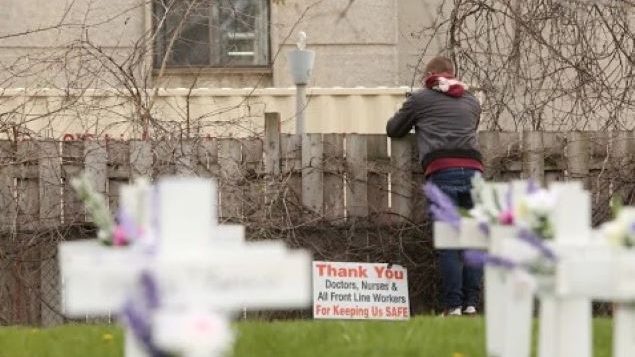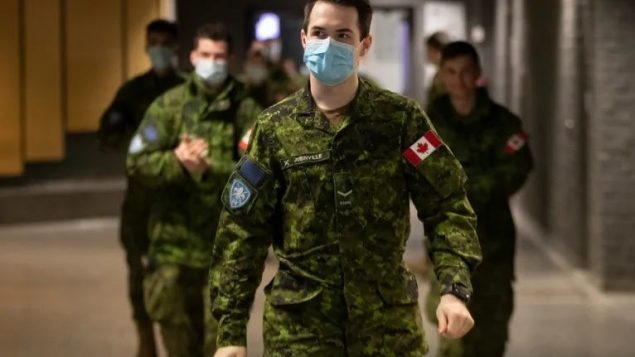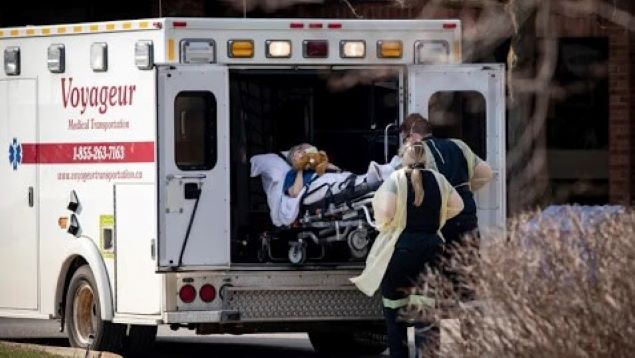The union that represents workers at long-term health-care facilities across the country says it is launching a nationwide effort to make long-term care universal and publicly funded.
The Canadian Union of Public Employees (CUPE) represents about 65,000 long-term care nurses, aides and dietary, cleaning and administrative staff.
It wants long-term care facilities brought into the public healthcare system and regulated by the Canada Health Act.
Why?
Nursing homes account for a little over 70 per cent of the nearly 6,500 COVID-19 deaths in Canada.
That compares with about 50 per cent in Europe and around 40 per cent in the United States.

A memorial is seen outside the Camilla Care Community long-term care facility in Mississauga, Ontario, where at least 56 residents have died of COVID-19. (Michael Charles Cole/CBC)
Last week, Mark Hancock, the president of the union, which represents 700,000 workers across the country in a variety of sectors, wrote a letter to Prime Minister Justin Trudeau and other federal party leaders calling for immediate action.
On the weekend, the union said it will ramp up previous calls to overhaul the long-term care system and will launch a new campaign to educate the public and catch the attention of federal politicians.
“Right now, long-term care in Canada is a patchwork system with no national standards,” said CUPE national secretary-treasurer Charles Fleury in a news release.
“It’s time to fix that.”
The union has long warned about the dangers seniors in long-term care homes face.
They include a frail population, old buildings with little space to separate the sick from the healthy and frequent contact between residents and caregivers.
Analysts say the facilities are chronically understaffed and many employees, including health aides are paid low wages and earn a living by working part time shifts at several facilities without sick pay, making them vectors of transmission between homes.
She said residents were often left unbathed in soiled diapers or clothing by overworked and underpaid staff.
“COVID-19 didn’t create the deadly crisis we’re facing in long term care. The systemic issues that facilitated this heartbreaking situation existed long before this moment,” she said.
“What the pandemic is doing is shining a spotlight on those problems and making them worse.”
As the crisis worsened, the Canadian military began deploying over 1,750 personnel to nursing homes in April in Quebec and Ontario to help out.

Members of the Canadian Armed Forces leave a Red Cross training course at Collège Ahuntsic in Montreal on April 29, 2020. (Ivanoh Demers/Radio-Canada)
In his May 12 press briefing, Prime Minister Justin Trudeau announced that seniors will be receiving a one-time payment of up to $500 to help offset any increases in the cost of living due to COVID-19, saying more work needed to be done on both short-term fixes and longer-term solutions.
COVID-19 has exposed some “uncomfortable truths” about Canadian society, including how we care for seniors, he said.
“We’ve seen heartbreaking tragedies in long-term care facilities and nursing homes right across the country. Overworked staff. Understaffed residences. Grieving families. There are serious, underlying challenges facing these facilities. And in the coming months, the federal government will be there to help the provinces find lasting solutions,” he said.

A resident on Lumsden Avenue in Toronto put up this sign in April, thanking frontline workers for their COVID-19 efforts. (Michael Wilson/CBC)
Last week Ontario announced it was launching an independent commission into the province’s long-term care system–marking the first time a jurisdiction in the country had announced a wide-scale investigation into its long-term care system as a result of the COVID-19.
Long-term care Minister Merrilee Fullerton said the commission will start in September.
“An independent, non-partisan commission is the best way to conduct a thorough and expedited review,” Fullerton said in a news release.
“As we all take steps to contain this pandemic, the commission will get down to work and provide us with guidance on how to improve the long-term care system and better protect residents and staff from any future outbreaks.”

Long-term care home workers take part in a moment of silence and rally in front of Midland Gardens Care Community in Toronto earlier this month. (Evan Mitsui/CBC)
Others want more.
The Ontario Long-Term Care Association, opposition parties and the Service Employees International Union (SEIU) have all called for a full public inquiry into the sector, rather than an independent commission.
The SEIU, which represents some 60,000 frontline health-care workers, said families of the dead “deserve the truth that only a public inquiry can reveal.”
With files from CBC News (Raisa Patel, Kathleen Harris), The Canadian Press, and RCI (Levon Sevunts).







For reasons beyond our control, and for an undetermined period of time, our comment section is now closed. However, our social networks remain open to your contributions.